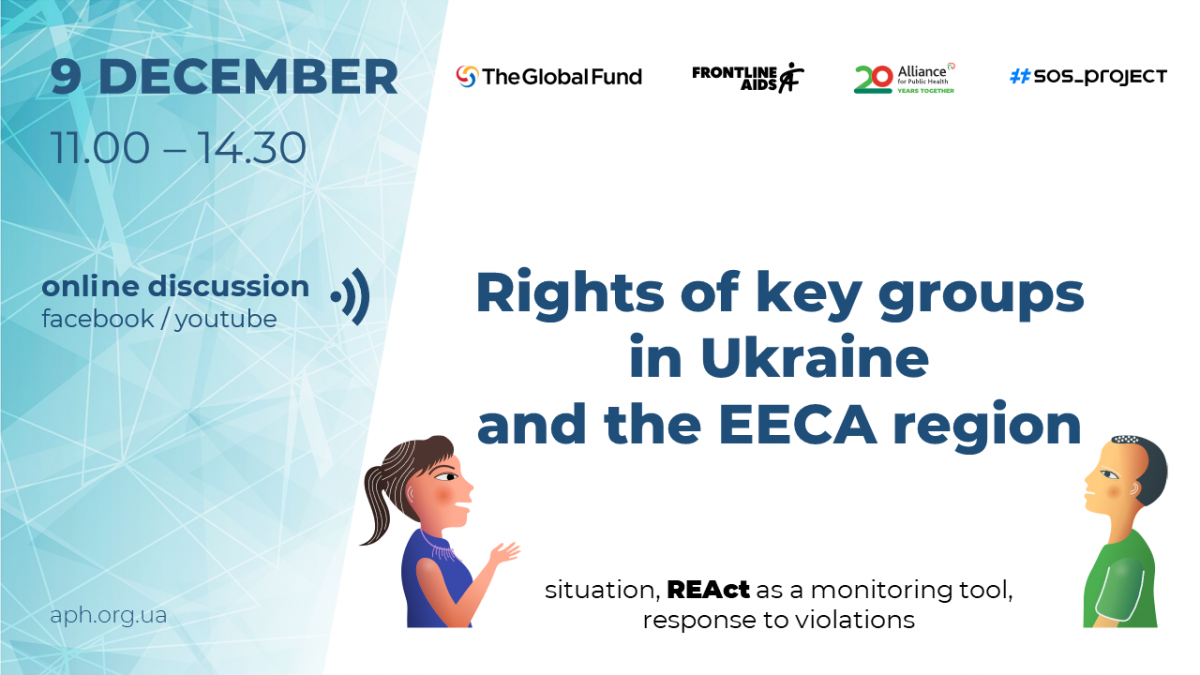On December 9, 2020, from 11:00 to 14:30 (GMT + 2), on the eve of International Human Rights Day, a live discussion The rights of key groups in Georgia, Moldova, Kyrgyzstan, Tajikistan and Ukraine: situation, monitoring, response to violations will be held.
The online event will for the first time unveil data on the analysis of offenses collected over the year in 5 countries with the REAct database – a unique system for responding to violations of the rights of key populations vulnerable to HIV and tuberculosis (TB). During the year, about 2000 cases were registered from people living with HIV and representatives of key groups.
“It is impossible to stop the HIV and TB epidemics by continuing to violate human rights, criminalize groups at risk, practice gender inequality. And inaction is unacceptable. REAct is an effective tool for monitoring human rights violations by communities, as well as for immediate response and protection of rights,” says Andriy Klepikov, Executive Director of the Alliance for Public Health.
As part of the online discussion, an analytical report on Georgia, Moldova, Kyrgyzstan, Tajikistan and Ukraine will be presented, which reflects the main trends and nature of human rights violations among representatives of key groups, as well as offers recommendations for improving the situation in each of the countries. The main goal of the event is to combine experience and improve the effectiveness of human rights work.
As noted by the Alliance for Public Health, based on the analysis in 5 countries, it is clear that representatives of key populations, namely people living with HIV, people who use drugs, men who have sex with men and sex workers do not have equal access to the exercise of their rights. and freedoms.
Discussion speakers:
- Andriy Klepikov, Executive Director, Alliance for Public Health;
- Igor Kuzin, acting General Director, Public Health Center of the Ministry of Health of Ukraine;
- Tetiana Deshko, Director of International Programs, Alliance for Public Health;
- Mikhail Golichenko, international human rights expert, Senior Analyst, Canadian HIV/AIDS Legal Network;
- Marina Novachuk, Senior Adviser, UNAIDS Country Office in Ukraine;
- Olga Varetskaya, Associate Director for Strategic Information and M&E, Alliance for Public Health.
We invite you to participate in the online broadcast on Facebook (in Russian and English).
Remarkably, Article 25 of the Universal Declaration of Human Rights emphasizes that everyone has the right to medical care. Health for All has become a key principle in the work of WHO and all international and national health institutions. However, according to the collected evidence in the REAct database, the main violations of the rights of at-risk groups in the countries of the region are discrimination, misconduct, violence by law enforcement agencies (45% of cases), denial of access to medical services, disclosure of medical data and stigma by employees of institutions health care (26%), physical violence against women by both sex partners and relatives and police officers (20%).
To date this tool for responding to human rights violations is being successfully implemented by the Alliance for Public Health team with partners in 5 countries, and by the end of 2020 it is planned to expand the geography of work to 2 more countries. Overall, the REAct partnership in the EECA region accounts for 14 non-governmental organizations in Georgia, 9 in Moldova, 7 in Tajikistan, 13 in Kyrgyzstan, and 28 in Ukraine. The overall project coverage includes 28 cities in Eastern Europe and Central Asia. The REAct team, in addition to recording complaints on violations, provides consultations for victims on legal issues, provides social assistance and support, and also assists in solving cases through mediation or appeals to law enforcement agencies.
LIVE streaming
In English:
In Russian:


